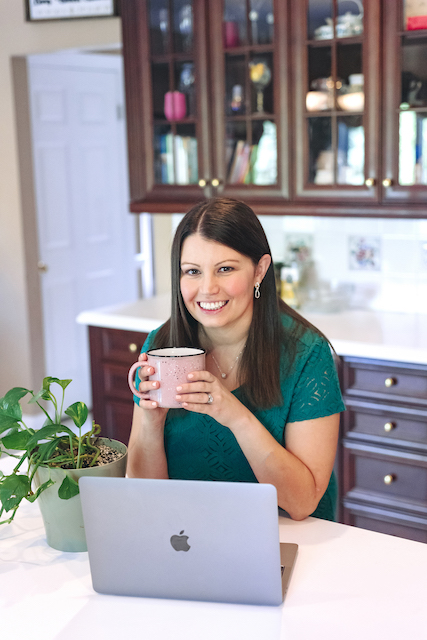5 Tips for Feeding Your Family with More Joy & Less Guilt
- Beth Conlon, PhD, RDN

- Apr 30, 2021
- 4 min read
Like many parents out there, I've had my share of feeding struggles: trying to get the right balance between what tastes good and what's healthy; managing picky eaters; figuring out how to feed my family while on-the-go. This blog post is for all those parents and caregivers who feel stuck in their own mealtime rut... feeling guilty about not making something more exciting or worrying that you're not giving your child the best nutrition possible. So I am sharing tips that have helped many parents (including myself!) ditch that guilt and find joy in feeding their families.
What is Guilt?
First, let's start with an overview of guilt. Guilt is a complicated and often misunderstood emotion. In short, it's an emotion that we feel when we think about what we've done wrong or how we could do better in the future. We can feel guilty for something we did, or even for things that happened to us. Guilt can be a really tough thing to deal with because it makes us feel like we're not good enough. But the truth is that guilt is never a reflection about about who you are as a person. In fact, guilt can be a good thing because it encourages us to make things right and change our behavior for the better. So next time you're feeling guilty, know that there are two types of guilt: healthy and unhealthy guilt. Healthy feelings of guilt encourage us to correct bad decisions, while unhealthy ones lead us to dwell on them over and over again. Knowing this gives us control over our guilt. And when we have control over something, we can change it!
In this blog post we will explore ways to build confidence and let go of feeding-related guilt.
1. Practice Self-Compassion.
Self-compassion means being kind towards ourselves when feeling overwhelmed or disappointed about something we feel like we failed at or did wrong. Guilt often arises from situations where parents feel like they couldn't do enough or didn't act in time which can lead them down a path of self-blame and shame. One of the best pieces of parenting advice I ever received was to have self-compassion and let go of guilt. It's easy to beat ourselves up when we feel like we're not doing our best, but the truth is that you are your own worst critic. You'll never be perfect, and that's okay! There will always be something more you could do for your kids - just give yourself a break and don't get so hard on yourself. We all make mistakes as parents; it's part of the job description! Practicing self-compassion will help you let go of guilt so that you can take better care of yourself, which in turn will help you take better care of your family.
2. Empower Yourself with Nutrition Knowledge
It's hard to know where to start with a subject like nutrition. It can be so overwhelming and frustrating, especially when you don't have the time (and what parent does?!). I am such a big believer that the more you know about nutrition, the more confident you will feel, and the more joy you will find in feeding your family (with less guilt!). You might not get it all figured out at once and that's okay. Take some pressure off by educating yourself with resources you trust. Registered Dietitian Nutritionists are THE nutrition experts.
Why? RDNs are trained professionals who have met the following criteria to earn the RDN credential:
Completed a minimum of a bachelor’s degree at a US regionally accredited university or college and course work accredited or approved by the Accreditation Council for Education in Nutrition and Dietetics (ACEND) of the Academy of Nutrition and Dietetics.
Completed over 1200 ACEND-accredited supervised practice hours at hospitals, health-care facilities, community agencies, and foodservice facilities.
Passed a national examination administered by the Commission on Dietetic Registration (CDR). For more information regarding the examination, refer to CDR’s website at www.cdrnet.org.
Completed continuing professional educational requirements to maintain registration.
Subscribe to my email list and follow me on social media for reliable pediatric nutrition information, tips, and resources!
3. Live by the Division of Responsibility in Feeding by Ellyn Satter.
The Division of Responsibility in Feeding is supported by the American Academy of Pediatrics and backed by several decades of high-quality research, clinical experiences, and anecdotes. In short:
The parent provides & the child decides.
In other words, it is the parent’s responsibilities to provide foods, determine when food is offered, and determine where food is offered. It is the child’s responsibilities to decide how much to eat (as many servings as they like) and if they will eat (they may choose not to eat).
If you, the parent or caregiver, are providing mostly healthy, balanced foods (and even allowing for some sweets & treats!) throughout the day – that is great! You are doing your part successfully.
To be honest, I struggle with this myself. There are plenty of times where I want to tell one of my children – just take two more bites of your food! Or, please, just take a bite of that vegetable! But, I remember this rule and bite my tongue. And sometimes, my kids surprise me! And everyone is better off in the end.
4. Set Simple & Realistic Goals
You may feel guilt, failure, or shame because you feel like you aren't meeting certain expectations. For example, you may feel guilty because the meals you make (or haven't been making lately!) aren't where you want them to be. One thing that you can do right now is reclaim your family's health goals (I LOVE this Podcast episode by Jill Castle, MS, RDN that gives great tips on this - check it out: TNC 126: How to Recapture Your Family Health Goals in 2021 - The Nourished Child).
It is important to set simple and realistic goals. For example, your may want your family to eat healthier. But what does eating healthy look like to you? What is involved in eating healthy? Break down larger goals into smaller, simpler, and more realistic goals.
Some ideas/examples are:
Cook meals 3 times a week instead of ordering takeout or eating "quick grab" meals
Meal prep one day a week - pack balanced snacks (check out my IG post on this!) a
Create a meal schedule that works for you and your family
Have you ever felt guilty? What was your experience? Let's talk about this in the comments below!

_edited.png)









